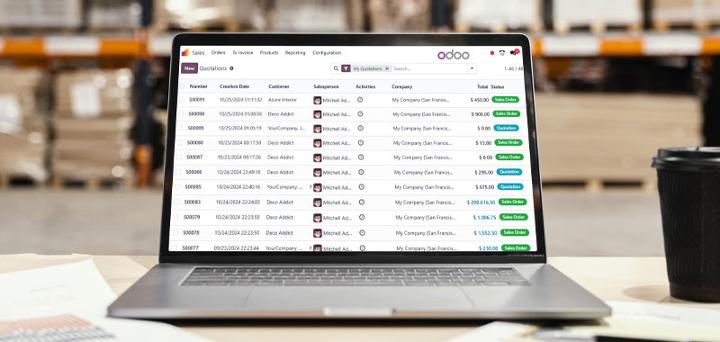Open-Source ERP Developer
Trading and distribution companies, nowadays, get a lot of pressures to manage their inventory, streamline their operations, so as to satisfy their customers. In response to these challenges, they have are in a constant search for Enterprise Resource Planning (ERP) software. And we know it can be another set of challenging task to find one. Among all such applications, Odoo is one that has been very recently used by most organizations. But thinking why right, our reads will get their answer right here as in this content piece we will read about the various components associated with the Trading & Distribution Industry, and how does odoo help this sector in growth and operations.
Odoo ERP is the most popular open-source solution which provides the full suite of applications specially designed for the trading and distribution industry. In this article, we would discuss the features, advantages, disadvantages, forms of license options, effective measures for its implementation, and future trends of Odoo ERP software in the trading and distribution sector.

What is Odoo ERP?
Odoo is a flexible system of ERP, assimilating several business operations within a single environment. It comes integrated with various modules such as sales management, inventory control, accounting, customer relationship management, and more. Using this approach, business operations get streamlined, data becomes more visible, and decisions can be made on data analysis. In this respect, Odoo's modularity enables companies to tailor their ERP system to fit unique company needs. Thus, it is available for use by any company, whether small, medium, or large.
Key Features of Odoo ERP for Trading and Distribution
1. Sales Management: Odoo offers an effective module for sales management, creating and managing sales orders, invoices, and delivery orders. Through this module, the user is able to track the interactions of a customer, monitoring sales performance and even generating reports that give insights into the trends of sales.
2. Inventory Control: Effective inventory control is very crucial in the operations of trading and distribution companies. Odoo provides an inventory module in which you can track your inventory in real time. There is an automated reordering based on an earlier preset threshold, and a report detailing the movement of the inventory. This allows the business to carry optimum stock and avoid the carrying costs.
3. Procurement Management: The Purchase module of Odoo is able to manage the whole affair that is related to vendors. Users can generate purchase orders, track vendor bills, and track the inventories at the required level in order to ensure replenishment within time. It also provides detailed reports to evaluate the performance of the supplier.
4. Logistics Management: The Odoo modules handle delivery orders and shipment logistics. Shipment status is tracked in real time, while routes for optimum deliveries are optimized in order to completely deliver the orders from the customers.
5. Accounting and Finance: Accounting of Odoo provides a totally integrated accounting solution that is well-integrated with all its modules. Users become enabled to manage accounts payable, accounts receivable, and the account books can be produced and more about financial reporting, accounting needs, etc. with tax compliance ensured as per the respective local tax regulations prevailing.
6. CRM: The module of CRM in Odoo helps the business to sustain a relationship with a customer. Users can track leads, contact customer communications, and analyze data on customers to enhance the service.
7. Real Time Analytics: Features in Odoo allow business to look at how the performance is being monitored through customizable dashboards and reports. A data-driven approach provides information leading to smart and well-judged decision-making.
8. Scalability: Scalability is one of the most important features of Odoo. When businesses grow or change, new modules or functionalities can be easily added without causing much disruption.
Benefits of Implementing Odoo ERP in Trading and Distribution
1. Efficiency: The fact that the same processes- from order entry to inventory tracking- are significantly automated reduces operational inefficiencies. This also prevents the employees from wasting time on such mundane work and helps them work on something else of higher value.
2. Improvement of customers' service: On the basis of real-time visibility on levels of inventory and status of orders, a business will be able to offer better services to its customers in respect of delivery within time as well as correct order fulfillment.
3. Cost Saving: Odoo by optimizing product inventory management and consequently preventing a manual error during order processing saves cost on sales opportunities losses and excess inventory.
4. Improved Collaboration: Since it is an all-in-one solution, Odoo enables different departments of the same organization to improve their collaboration by accessing data in real-time across various modules.
5. Data-Driven Decisioning: Since any company has access to direct live analytics and reporting products, one will be able to take proper decisions based on actual data rather than biased impressions or out-of-date information.
6. Personalization: Odoo being based on modular architecture offers the provision to an enterprise to personalize the ERP system as needed by the business with the specific requirements of their business without incurring the costs that proprietary software solutions are typically associated.
Disadvantages of Odoo ERP
Though Odoo provides numerous benefits for trading and distribution companies there are some potential drawbacks
1. Tutorial Curve: Like all entire software packages, implementing Odoo ERP hurts with the pangs of a tutorial curve. Training employees on the use of the system is required.
2. Initial Investment Costs: While Odoo is free, open-source software available for download, it will cost to implement, as employees require customization training and ongoing support.
3. Dependency on Internet Connectivity: Cloud-based Odoo ERPs are entirely based on the grounds of providing proper internet connectivity for remote access to the system.
4. Complexity in Customization: It is correct that customization is one of the strengths provided by Odoo, but high complexity in customization implies higher complexity at the time of controlling the system.
Few Licensing Options that Odoo ERP provide
Odoo offers various licensing options based on the business requirement as follows:
1. Community Edition: This is the free version of Odoo available. This edition comes with simple functionalities, but some other advanced features are only available in the Enterprise Edition.
2. Enterprise Edition: The edition comes with some more extra features such as extended reporting tools and proprietary modules supported with more quality services than those offered in the Community Edition. This generally has a subscription-based pricing according to the no. of users.
3. Cloud-Based Solutions: Options include self-hosted installations or cloud-based solutions by Odoo itself. Cloud solutions offer flexibility but may usher in the risks of recurring subscription costs.
4. License Agreements by Usage: Custom license agreements may be negotiated with the Odoo partners for large organizations or even those which have specific needs.
How to get Effective Implementations?
Implement the following to maximize the benefit of Odoo ERP software in the distribution company
1. All-around Training Programs: Because proper training of the workers will get to understand how to operate the system effectively from the very first day.
2. Phased Roll-Out Strategy: Executing the program in stages rather than in full will allow organizations to discuss issues brought to their attention without shocking users.
3.Regularity in Upgrades and Maintenance: Software updates typically give businesses the new technology as well as the new security measures.
4.Communication with an Expert Partner: An expert Odoo partner will assist in some of the overcoming smooth implementation issues while offering the best insights about best practices within organizations.
5.User Feedback Systems: Having systems that would solicit feedback from users would allow the identification of where more training might be necessary or systems improvement to better the user-friendliness of the system.
Future Developments of Odoo ERP in Trading Companies
In the near future, at least within the trading and distribution industries, the rate at which technology develops has been rapid, resulting in there being significant trends shaping how Odoo ERP will evolve in the near future:
1. Integration with Artificial Intelligence: This is the integration of AI in an ERP system to provide for predictive analytics, which further enhances the determination of demand levels so that inventory can be thus optimized accordingly.
2. Enhanced mobility: The increase in employees and, by extension, traders to work remotely will create a demand for more advanced mobile functions within the Odoo application platform.
3. Increased Sustainability: Today, an increasing number of consumers in today's world, especially the young ones, are concerned about environmental issues, so trading companies would look at ERPs, identifying ways to trace sustainability metrics that are directly traceable through supply chains or product lifecycles better than ever before!
4. IoT Device Integration: the Internet of Things will act as one of the central enablers while creating future business models; hence, integration of data from the IoT within the bidding process can offer clues about system performance & requirement of maintenance as well!
5. Blockchain Technology Adoption: with all the supply chains worldwide now highly transparent, blockchain technology will help in efficiently and securely making transactions while still maintaining accountability with each step involved-from procurement all the way to delivery.
Lastly, The Odoo ERP software efficiently addresses operational improvement alongside improving the customer service capacities in the distribution companies! With the comprehensive feature set that really encompasses tools for the management of sales; robust tracking for the inventory; streamlined logistics operations; accounting functionalities; real-time analytics capabilities; & scalability options, Odoo’s' platform is the best amongst competition and if you are searching a good odoo ERP implementation partner, the user can also work with odoo-developers.com for a more increased efficiencies & improved decision processes! The partners also work with trends like AI integration & IoT adoption continually shaping this space going forward-the outlook is indeed brighter!
Invest now in odoo-developers.com find yourself well in advance of competitors competing for an equivalent's share!
Frequently Asked Questions
How does the odoo ERP accounting help in trading and distribution industry?
Accounting of Odoo provides a totally integrated accounting solution that is well-integrated with all its modules. Users become enabled to manage accounts payable, accounts receivable, and the account books can be produced and more about financial reporting, accounting needs, etc. with tax compliance ensured as per the respective local tax regulations prevailing.
What is IoT Device Integration?
IoT Device Integration will act as one of the central enablers while creating future business models; hence, integration of data from the IoT within the bidding process can offer clues about system performance & requirement of maintenance as well!
What is an ERP system in distribution?
The ERP system in distribution assist in several business operations within a single environment. It comes integrated with various modules such as sales management, inventory control, accounting, customer relationship management, and more. Using this approach, business operations get streamlined, data becomes more visible, and decisions can be made on data analysis. In this respect, Odoo's modularity enables companies to tailor their ERP system to fit unique company needs. Thus, it is available for use by any company, whether small, medium, or large.
What are main four types of ERP used in the Trading & Distribution Industry?
The main Four types of ERP Systems are On-premise, Cloud, Hybrid, Multi cloud.
Read More:
The Importance of Business Analysis in Odoo Implementations?